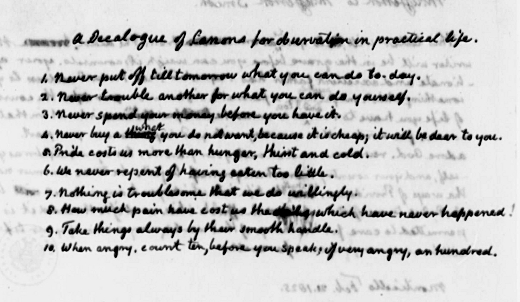I love lists.
I write a lot of lists.
The older I get, the more my memory relies on lists.
Lists Of Note.
Here are two of my favorite entries:
In 1933, renowned author F. Scott Fitzgerald ended a letter to his 11-year-old daughter, Scottie, with a list of things to worry about, not worry about, and simply think about. It read as follows.
Things to worry about:
Worry about courage
Worry about cleanliness
Worry about efficiency
Worry about horsemanship
Things not to worry about:
Don’t worry about popular opinion
Don’t worry about dolls
Don’t worry about the past
Don’t worry about the future
Don’t worry about growing up
Don’t worry about anybody getting ahead of you
Don’t worry about triumph
Don’t worry about failure unless it comes through your own fault
Don’t worry about mosquitoes
Don’t worry about flies
Don’t worry about insects in general
Don’t worry about parents
Don’t worry about boys
Don’t worry about disappointments
Don’t worry about pleasures
Don’t worry about satisfactions
Things to think about:
What am I really aiming at?
How good am I really in comparison to my contemporaries in regard to:
(a) Scholarship
(b) Do I really understand about people and am I able to get along with them?
(c) Am I trying to make my body a useful instrument or am I neglecting it?
With dearest love,
Daddy
In 1825, the year before his death, Thomas Jefferson — the 3rd U.S. President and a Founding Father of the United States of America — was asked by a father to supply some words of wisdom to his young son, Thomas Jefferson Smith, who had recently been named after him. Jefferson graciously responded with a handwritten letter, at the end of which was the following 10-point list of advice for the youngster, titled, "A Decalogue of Canons for observation in practical life."
Each and every word still rings true.
Transcript follows. Image courtesy of the Library of Congress.

Transcript
Each and every word still rings true.
Transcript follows. Image courtesy of the Library of Congress.

Image: Library of Congress
Transcript
A Decalogue of Canons for observation in practical life.
1. Never put off till tomorrow what you can do to-day.
2. Never trouble another for what you can do yourself.
3. Never spend your money before you have it.
4. Never buy what you do not want, because it is cheap; it will be dear to you.
5. Pride costs us more than hunger, thirst and cold.
6. We never repent of having eaten too little.
7. Nothing is troublesome that we do willingly.
8. How much pain have cost us the evils which have never happened.
9. Take things always by their smooth handle.
10. When angry, count ten, before you speak; if very angry, an hundred.


No comments:
Post a Comment